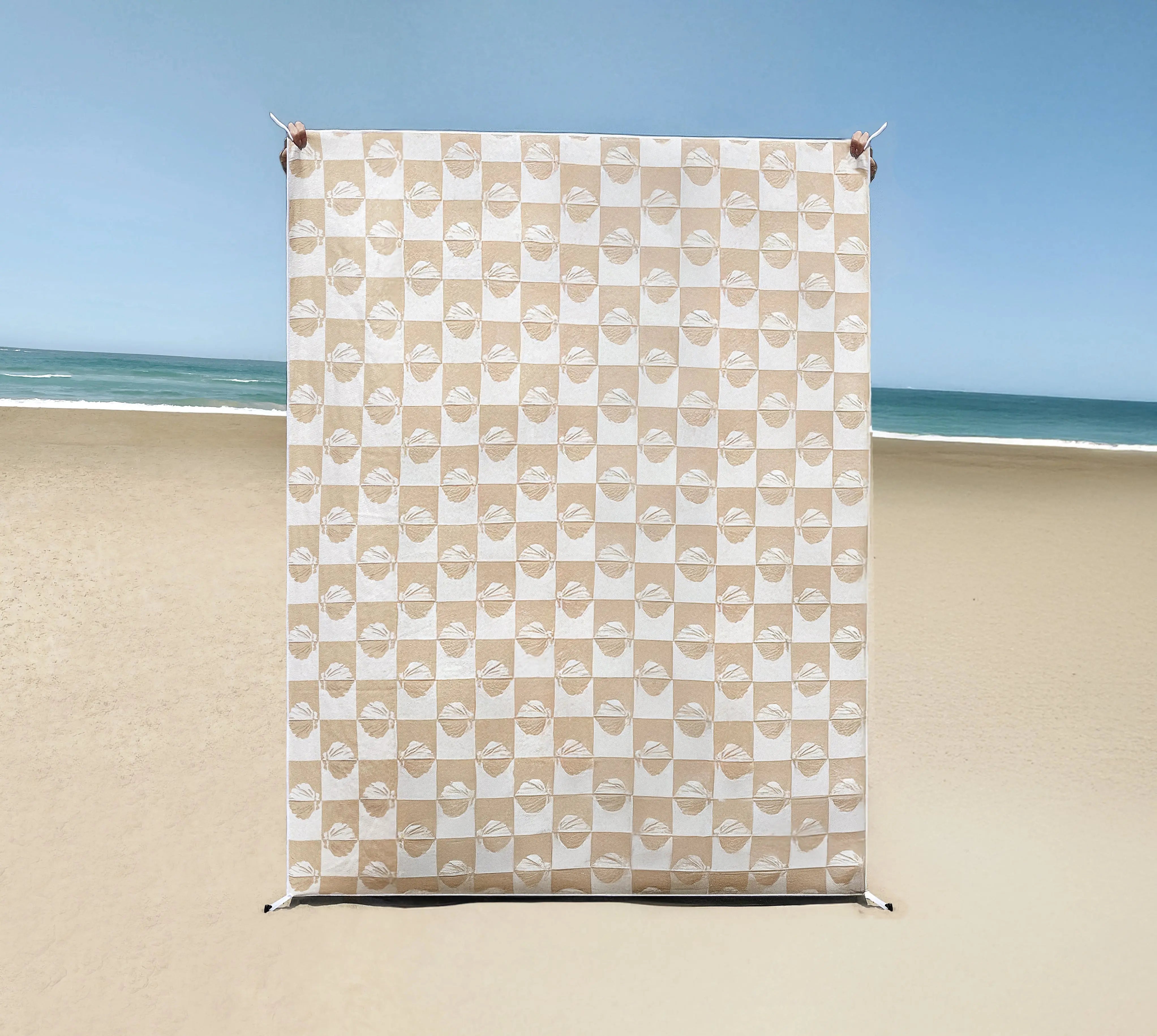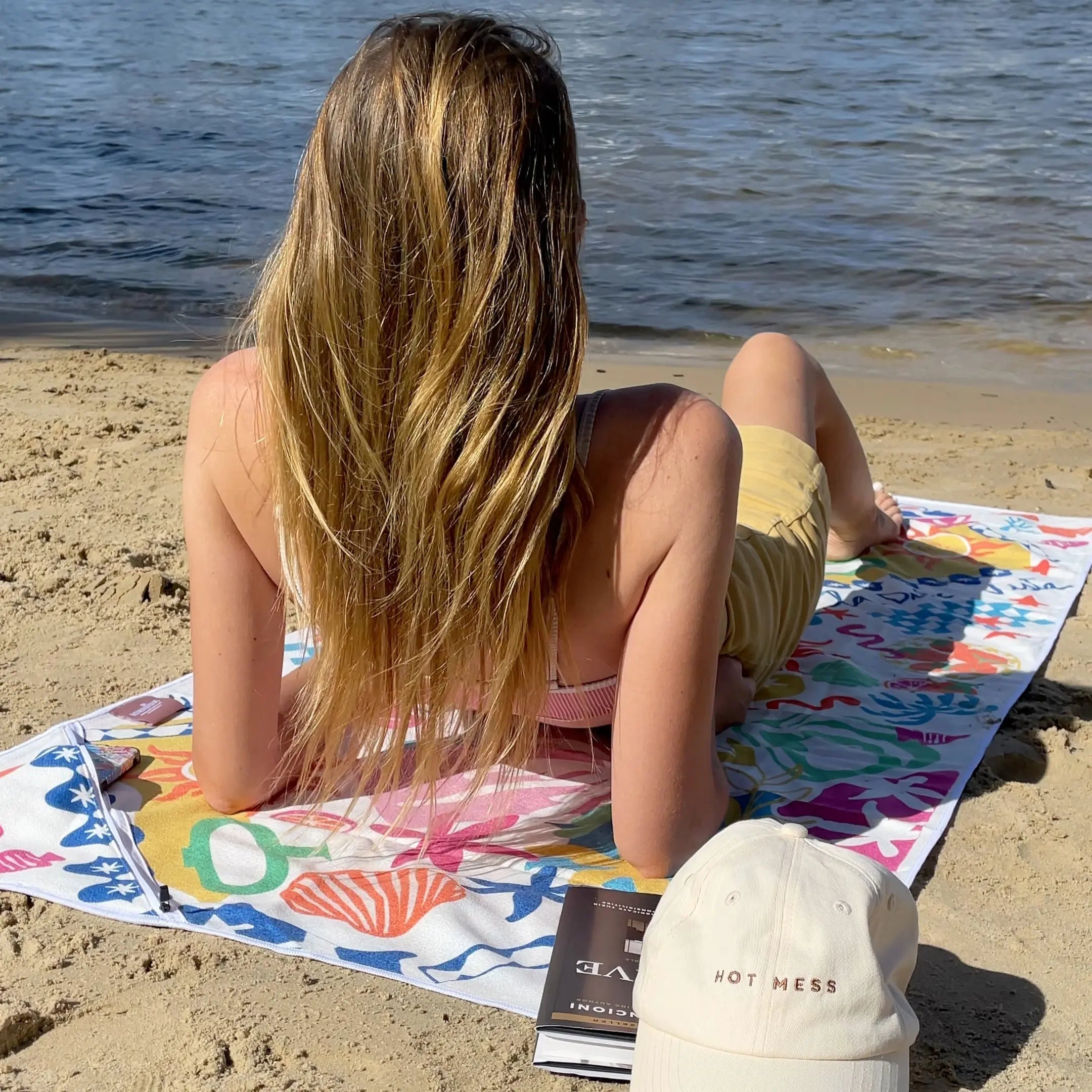Travelling is one of the best ways to connect with the world – the people, the landscapes, the cultures, and the incredible experiences that come with it. But let’s be real: travel can also take a toll on the planet if we’re not intentional.
From single-use plastics at the airport to cheap fashion and over-tourism, it’s easy to rack up an accidental footprint. The good news? A few small swaps in your routine can make a massive difference. And no – this isn’t about perfection. It’s about choosing better, more conscious options that don’t compromise your comfort or style.
Whether you’re jetting off to Bali, road tripping the coast, or planning a Euro summer adventure, this guide is packed with practical, feel-good tips to help you become a more eco-friendly traveller – from sun care to what you pack in your beach bag (hint: it includes a sand free beach towel).

Why Sustainable Travel Matters
Before we get into the how, let’s talk about the why.
Every year, tourism accounts for roughly 8% of global carbon emissions. That includes flights, accommodation, waste generation, and energy use. Add to that the environmental pressure on fragile ecosystems and the cultural impact of mass tourism, and it’s clear: how we travel matters.
But it’s not all doom and gloom. You can still explore the world, relax on beautiful beaches, and soak up the sun – all while making better choices for the planet.
Pack Light, Pack Right
The more weight a plane carries, the more fuel it burns. That’s why minimalist packing isn’t just a travel hack – it’s a sustainable move. But lightweight doesn’t have to mean less style or comfort. It just means packing smarter.
Here are a few essentials that keep your bag light and your impact lower:
1. Reusable Water Bottle
Say no to single-use plastics and bring your own bottle. Stainless steel or BPA-free bottles are perfect for staying hydrated at the beach, airport, or on the go. Bonus points for one with a filter if you're travelling to destinations with uncertain tap water.
2. Reusable Shopping or Tote Bag
Whether you're browsing local markets or grabbing groceries, a foldable tote saves you from using plastic bags. Keep it in your beach bag – it's useful for wet swimmers or spontaneous picnics too.
3. Refillable Toiletry Bottles
Ditch the hotel minis and bring your own refillable toiletry set. Opt for solid shampoo bars, body wash bars, and toothpaste tablets to save space and reduce waste.
4. Sand Free Beach Towel
A game changer. Not only is a sand free beach towel better for the environment (especially when made from recycled materials), but it’s also practical. It dries quickly, shakes off clean, and replaces the need for disposable mats or bulky hotel towels.
→ Check out our eco-friendly sand free beach towels made from recycled plastic bottles

5. Travel Towel for Day-to-Day
Having a quick-dry travel towel in your daypack means you can skip plastic-wrapped wipes or single-use cloths at waterfalls, hostels, or sweaty hikes. A good travel towel is compact, long-lasting, and multi-use.
Choose Eco-Conscious Accommodation
Where you stay makes a difference. Look for eco-certified hotels, hostels, and guesthouses that prioritise sustainable practices like:
-
Solar energy use
-
Water-saving systems
-
Waste reduction and composting
-
Support for local businesses and staff
-
Low-impact architecture or restored heritage buildings
Not sure where to find them? Platforms like EcoHotels, BookDifferent, or simply reading a place’s sustainability section on their website is a great start.
Be Mindful with Sunscreen
Here’s something most people don’t know: many commercial sunscreens contain chemicals (like oxybenzone) that harm coral reefs and marine ecosystems.
If you're heading anywhere tropical, opt for reef-safe sunscreen. These are made with mineral-based ingredients like zinc oxide and titanium dioxide, and they protect your skin without harming ocean life.
Look for water-resistant formulas, and reapply every few hours – especially after swimming or towelling off with your beach towel.
Support Local, Not Mass-Made
Every dollar you spend while travelling is a vote for the kind of world you want to live in. Supporting small, local businesses instead of global chains helps:
-
Strengthen local economies
-
Keep cultural practices alive
-
Reduce transport emissions tied to imported goods
So skip the airport souvenir shop. Buy handmade jewellery from a local artist. Eat at the family-run restaurant. And choose a locally made sarong instead of a fast-fashion cover-up.

Say No to Fast Fashion Beachwear
We get it – cute outfits are part of the holiday mood. But most fast fashion is produced in ways that exploit workers and the environment.
Instead of buying multiple new pieces for every trip, build a beachwear capsule wardrobe of high-quality basics. Choose breathable fabrics like organic cotton, hemp, or Tencel. And opt for items that mix and match easily.
A few go-to pieces, one great hat, and your favourite beach towel is all you need.
Offset Your Flight (and Choose Direct When You Can)
If flying is unavoidable, consider offsetting your carbon emissions. Many airlines offer carbon offset programs, or you can use platforms like Gold Standard or Sustainable Travel International.
Better yet, choose direct flights where possible. Take-offs and landings burn the most fuel, so fewer connections mean lower emissions.
And when travelling locally – choose the train, bus, or carpool over short-haul flights.
Eat Like a Local (and a Minimalist)
Food waste is one of the biggest problems in the tourism industry – but it’s easy to minimise.
-
Choose restaurants that serve local, seasonal food
-
Eat smaller portions and share plates
-
Avoid buffets (they waste a huge amount daily)
-
Carry reusable utensils or straws
-
Bring snacks from home in your tote to avoid packaged options
Bonus: a beach picnic is the ultimate low-impact lunch. All you need is a fresh loaf of bread, some local cheese, fruit from the market, and your sand free beach towel to lay it all out.
Respect Nature Like a Local Would
The golden rule: leave no trace.
-
Don’t carve your name into trees
-
Don’t feed wildlife
-
Stay on marked trails
-
Bring rubbish back with you
-
Choose ethical tour companies for wildlife experiences
If you’re snorkelling, hiking, or just sunbathing – remember that nature isn’t a theme park. It’s a home, and we’re just visitors.
Choose Gear That Lasts
This one’s simple: buy less, choose well.
A cheap towel might seem fine for one trip – until it starts smelling, traps sand, or falls apart in the wash. A high-quality beach towel or travel towel made from recycled material not only performs better, but it’ll last you season after season.
→ Shop our sustainable beach towels built for real travel life
The same goes for your sandals, backpack, water bottle, or swimmers. One good product always beats five bad ones.
Final Thoughts
You don’t have to overhaul your entire lifestyle to become a more eco-friendly traveller. The small changes – the swaps, the intention, the awareness – add up.
Choosing a sand free beach towel made from recycled bottles. Packing a travel towel instead of using hotel laundry. Supporting a local café instead of a global chain. They all count. They all matter.
And most importantly – they make travel more meaningful.
You’ll still catch the sunsets, the swims, and the slow, golden mornings. You’ll still come home with stories and memories. But you’ll also come back knowing you did it your way – lighter, kinder, and with the planet in mind.
Let your next adventure leave less behind.





Leave a comment
This site is protected by hCaptcha and the hCaptcha Privacy Policy and Terms of Service apply.